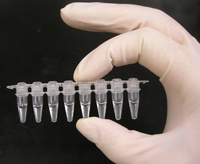
Necessity of multiplex ligation probe amplification in genetic tests: Germline variant analysis of the APC gene in familial adenomatous polyposis patients.
Sign Up to like & getrecommendations! Published in 2022 at "Cancer genetics"
DOI: 10.1016/j.cancergen.2022.02.002
Abstract: BACKGROUND Familial adenomatous polyposis (FAP) is an autosomal dominant hereditary cancer syndrome characterized by hundreds to thousands of colorectal adenomatous polyps. Without treatment, progression to colorectal cancer is inevitable. Most pathogenic mutations in the APC… read more here.
Keywords: adenomatous polyposis; probe amplification; familial adenomatous; multiplex ligation ... See more keywords

Rare chromosomal aberrations detected in children with multiple congenital anomalies: utility of multiple ligation dependant probe amplification for developing countries
Sign Up to like & getrecommendations! Published in 2021 at "Clinical Dysmorphology"
DOI: 10.1097/mcd.0000000000000370
Abstract: Chromosomal aberrations are an important cause of multiple malformation syndromes. Multiple ligation-dependent probe amplification (MLPA) a molecular cytogenetic technique has been suggested as a screening tool for the detection of chromosomal aberrations in resource-limited settings.… read more here.
Keywords: probe amplification; children multiple; congenital anomalies; mlpa ... See more keywords

Multiple Ligation-dependent Probe Amplification Along with Whole Exome Sequencing Should be Required for the Diagnosis of Structural Heterozygous Familial Hypercholesteremia
Sign Up to like & getrecommendations! Published in 2022 at "Internal Medicine"
DOI: 10.2169/internalmedicine.9412-22
Abstract: Familial hypercholesterolemia (FH) is an autosomaldominant hereditary lipid disorder, which can eventually cause the premature coronary artery disease (CAD). Recently, FH has been recognized as relatively common disease due to its prevalence (1 in 250-300… read more here.
Keywords: probe amplification; ligation dependent; genetic testing; whole exome ... See more keywords